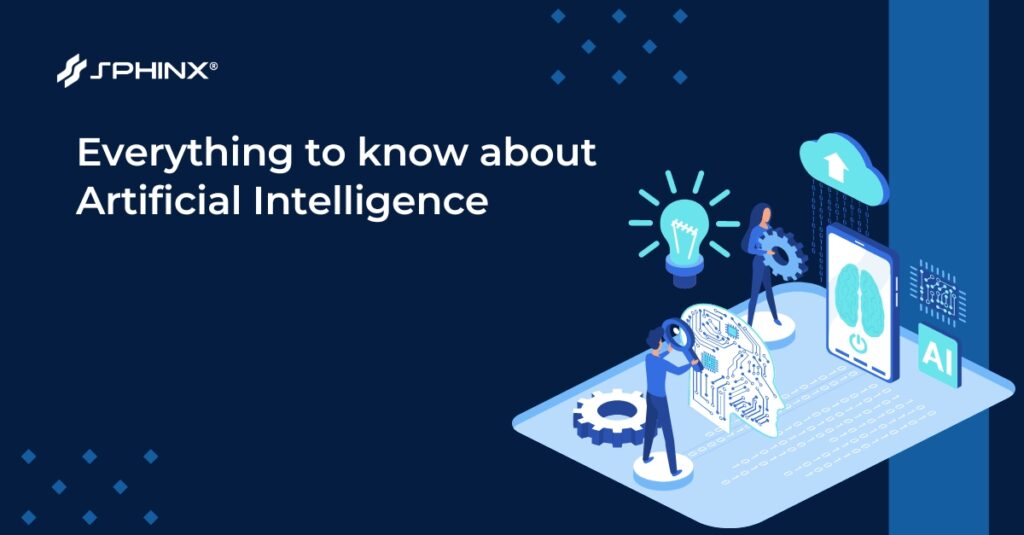Artificial intelligence (AI) has moved beyond the realm of science fiction and firmly established itself in our reality, indicating it’s here for the long haul. As society tries to comprehend the implications of existing AI technologies, its rapid development continues.
AI’s influence can be seen in various sectors, including industrial automation, scientific discovery, and the creative fields. To gain insights into AI, its functionality, its real-world uses, and the importance of standards for its responsible evolution, continue reading.
1. What is the meaning of AI development?
Artificial intelligence (AI) refers to the replication of human intellectual processes by machines designed to mimic human thought and behavior. This includes capabilities such as learning, reasoning, solving problems, understanding perception, and language comprehension.
Artificial Intelligence involves programming computers, robots controlled by computers, or software to mimic human-like intelligence. This is achieved by examining how the human brain functions and understanding its cognitive processes. The insights gained from these analyses are used to create smart systems and software.
2. What are types of AI?
Artificial Intelligence can be categorized into various types depending on its capabilities, functions, and underlying technologies. Below is a summary of the diverse forms of AI:
2.1. Based on Capabilities
2.1.1. Narrow AI (Weak AI)
This kind of AI is built to handle specific functions such as facial recognition, internet searches, or operating vehicles. The majority of modern AI technologies, even those capable of playing intricate games like chess and Go, are categorized here. These systems function within a confined scope or a predetermined set of scenarios.
2.1.2. General AI (Strong AI)
A kind of AI equipped with extensive cognitive abilities similar to humans, allowing it to independently manage new and unknown tasks. This sophisticated AI system has the ability to perceive, learn, and apply its knowledge to overcome any problem autonomously, without human intervention.
2.1.3. Superintelligent AI
This describes a potential version of AI that might exceed human capabilities in every area, such as creative thinking, overall wisdom, and solving problems. The concept of superintelligence is theoretical and has not been achieved yet.
2.2. Based on Functionalities
2.2.1. Reactive Machines
These AI models do not retain memories or prior experiences for subsequent activities. Instead, they evaluate and react to various scenarios. For instance, IBM’s Deep Blue, known for defeating chess grandmaster Garry Kasarov, serves as an illustration of this.
2.2.2. Limited Memory
These AI systems enhance their decision-making capabilities by analyzing historical data. Many of today’s AI applications, including chatbots, virtual assistants, and autonomous vehicles, utilize this approach.
2.2.3. Theory of Mind
This form of AI, which is still under development, involves the capability to comprehend and recall human emotions, beliefs, and needs, and to make decisions based on these factors. It necessitates a deep understanding of human nature by the machine.
2.2.4. Self-aware AI
This signifies a potential future for AI in which machines might develop their own consciousness, becoming sentient and self-aware. Such technology remains hypothetical and would involve AI systems that can comprehend and experience emotions, potentially leading to the formation of their own beliefs and desires.
2.3. Based on Technologies
2.3.1. Machine Learning (ML)
AI systems designed for self-enhancement use experience rather than direct programming for improvement. They focus on developing software that can autonomously learn by accessing and analyzing data.
2.3.2. Deep Learning
A branch of machine learning that utilizes multiple layers of neural networks. This technology is employed to analyze vast datasets and power features such as voice recognition in consumer gadgets, image identification, and numerous other uses.
2.3.3. Natural Language Processing (NLP)
This AI technology allows computers to grasp and analyze human speech. It finds its use in applications like chatbots, translation tools, and sentiment analysis services.
2.3.4. Robotics
This area focuses on the design, construction, operation, and utilization of robots, as well as the computer systems required to control them, provide sensory feedback, and process information.
2.3.5. Computer Vision
This technology enables devices to analyze and understand visual data from the environment, and it is applied in several fields including medical imaging, security monitoring, and industrial production.
2.3.6. Expert Systems
These AI technologies respond to inquiries and address challenges within a particular field of expertise by utilizing systems based on predefined rules.
3. What are the Benefits of AI in development?
Artificial intelligence (AI) has dramatically transformed the business development scene, offering numerous benefits to companies. More and more businesses are adopting AI to enhance their operational efficiencies. Utilizing AI in your business operations can lead to quicker and more precise outcomes.
3.1. Enhanced efficiency
AI technology provides unmatched processing power, enabling companies to quickly analyze large amounts of data. By employing AI algorithms, businesses can enhance various phases of product development, such as ideation, prototyping, testing, and optimization. Automation of repetitive tasks minimizes human error and shortens the time to market, helping companies stay flexible and responsive to market changes.
3.2. Data-driven decision-making
AI equips businesses with the tools to derive meaningful insights from comprehensive data sets. By evaluating historical data on products, customer feedback, market trends, and competitor activities, AI algorithms can identify patterns and forecast future developments. These insights support strategic decision-making, help mitigate risks, and refine product development tactics to more effectively meet consumer demands.
3.3. Improved product quality
AI technologies improve the quality of products through advanced simulations, testing, and validation processes. AI-driven applications can model various scenarios, uncover design issues, and enhance product functionality before physical prototypes are made. This approach saves time and reduces costs associated with multiple iterations, ensuring the end product meets or exceeds expectations.
3.4. Personalized customer experiences
In today’s personalized market, AI is crucial for understanding customer preferences and customizing products to fit those needs. AI analyzes customer data to pinpoint individual tastes, recommend tailored product features, and suggest additional products. These personalized interactions increase customer satisfaction, strengthen brand loyalty, and encourage repeat business.
3.5. Transformative psychometric analysis
AI-driven psychometric analysis explores user preferences and behavioral trends, giving developers critical insights to fine-tune products. This analysis helps understand the nuanced needs of different audiences, enabling the creation of products that resonate more deeply with users, enhancing satisfaction and fostering a stronger user-product connection, which is key to market success.
3.6. Reduced cost
AI helps cut costs in product development by forecasting material needs, reducing waste, and optimizing energy use during production. Automation of routine tasks allows human resources to focus on strategic tasks, thereby boosting overall efficiency.
3.7. Competitive advantage
Integrating AI into product development offers companies a considerable competitive edge. AI-generated insights facilitate rapid responses to market shifts, positioning companies at the forefront of innovation. This agility ensures timely product releases that align with changing consumer needs, staying ahead of competitors. Additionally, AI helps streamline operations, enhancing efficiency and shortening time-to-market, providing a strategic edge.
Final Thoughts
Artificial intelligence (AI) has gained significant popularity in the business industry, driving innovations in automation, data analysis, and customer service. Companies across various sectors are leveraging AI to enhance efficiency, personalize experiences, and gain a competitive edge.
Sphinx stands out as a premier provider of AI services in Vietnam, offering cutting-edge solutions tailored to the evolving needs of businesses. Selecting Sphinx for developing AI ensures access to top-tier expertise, advanced technology, and a commitment to excellence that can transform your operations and elevate your strategic goals.




CEO - Son Le
OTHER BLOGS
Blogs
10 Types of Outsourcing: How to Choose the Best One
Outsourcing has become a strategic lever for businesses seeking agility, cost efficiency, and access to specialized expertise. However, not all outsourcing models deliver the same value, and choosing the wrong approach can lead to operational friction, misaligned expectations, and limited returns. From traditional staff augmentation to fully managed services and...
Read MoreBlogs
AI Trends 2026: The Future of Enterprise Intelligence
Artificial Intelligence has moved beyond early adoption and isolated innovation. Today, AI is embedded across enterprise operations, from data analytics and customer engagement to risk management and decision support. However, as AI usage becomes widespread, many organizations are discovering that deploying AI alone does not automatically translate into strategic advantage....
Read MoreBlogs
IT Project Outsourcing for Enterprises: Strategic Best Practices
Enterprise organizations today are under constant pressure to innovate faster and modernize legacy systems, while also scaling technology capabilities without inflating operational costs. In this context, IT project outsourcing has evolved from a tactical cost-saving option into a strategic lever for long-term business growth. In this blog, we outline how...
Read MoreOTHER BLOGS
Our Sevices
IoT Development
SphinX offers cutting-edge IoT development services, seamlessly connecting devices and providing innovative solutions for a...
Xem thêmOur Sevices
Blockchain Development
We are highly proficient in engineering reliable and secure blockchain technologies from the ground up,...
Xem thêmOur Sevices
ERP & CRM Development
ERP & CRM development services that you need! Streamline business processes and enhance organizational efficiency....
Xem thêmOTHER BLOGS
Our Sevices
IoT Development
SphinX offers cutting-edge IoT development services, seamlessly connecting devices and providing innovative solutions for a...
Xem thêmOur Sevices
Blockchain Development
We are highly proficient in engineering reliable and secure blockchain technologies from the ground up,...
Xem thêmOur Sevices
ERP & CRM Development
ERP & CRM development services that you need! Streamline business processes and enhance organizational efficiency....
Xem thêm